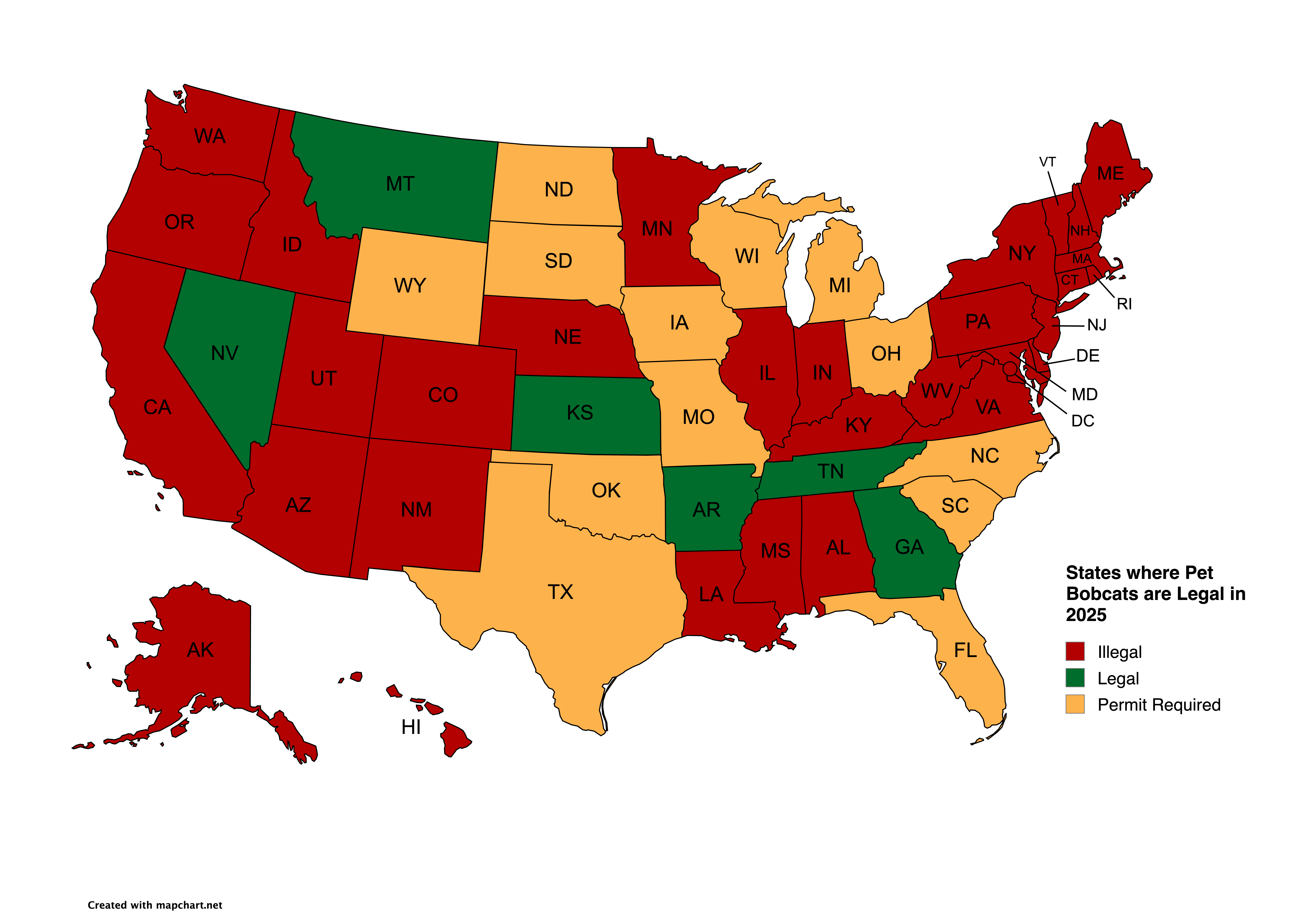Map of States Where Pet Bobcats Are Legal in 2025


David Chen
Data Visualization Specialist
David Chen is an expert in transforming complex geographic datasets into compelling visual narratives. He combines his background in computer science ...
Geographic Analysis
What This Map Shows
The map titled "States where Pet Bobcats are Legal in 2025" provides a clear visual representation of the states in the U.S. where owning a bobcat as a pet is permitted. It highlights the legal landscape surrounding exotic pets, specifically bobcats, which are often sought after by animal lovers for their wild beauty and unique characteristics. This map serves as a crucial tool for potential pet owners and wildlife enthusiasts alike, revealing which states have more relaxed regulations regarding the ownership of these fascinating animals.
Deep Dive into Pet Bobcats
Bobcats, scientifically known as Lynx rufus, are medium-sized wild cats native to North America. They are known for their distinctive tufted ears, short tails, and spotted fur, which allows them to blend seamlessly into their natural habitats. Interestingly, these creatures are incredibly versatile and can thrive in various environments, from forests to deserts. However, having a bobcat as a pet is not as simple as adopting a common domestic cat. The legality of bobcat ownership varies widely across the United States and is often influenced by state wildlife laws and regulations.
In recent years, there has been a growing trend in the exotic pet trade, with bobcats being among the more popular choices for those seeking a more unconventional pet. As of 2025, several states have legalized the ownership of bobcats under specific conditions, typically requiring permits or licenses. For instance, states like Nevada and Florida have set regulations that allow residents to keep bobcats as pets, provided they meet certain requirements to ensure the animals are cared for properly.
However, owning a bobcat can come with significant responsibilities. Unlike domestic cats, bobcats have wild instincts that can pose challenges to inexperienced owners. They require ample space, mental stimulation, and a diet that mimics their natural hunting habits. Additionally, owners must be prepared for the potential behavioral issues that can arise from keeping a wild animal in a domestic setting. This raises the question: are potential bobcat owners fully aware of what it takes to care for such a unique pet?
Interestingly, the push for legalizing pet bobcats has sparked debates among wildlife advocates and conservationists. Proponents argue that regulated ownership can help reduce the illegal exotic pet trade by providing a legal avenue for responsible pet ownership. Critics, however, express concerns regarding the welfare of these animals, emphasizing that many owners may not be equipped to provide the necessary care and environment for a bobcat to thrive.
Regional Analysis
When examining the map, it becomes evident that the legality of pet bobcats is not uniform across the country. For example, in the Midwest, states like Wisconsin and Minnesota have stringent regulations against owning exotic animals, reflecting a more cautious approach to wildlife conservation. Conversely, states in the Southwest, such as Arizona and New Mexico, are more permissive, allowing residents to own bobcats under regulated conditions.
Interestingly, the South also shows a mixed bag of regulations. States like Texas and Florida have favorable laws for exotic pet ownership, with Florida requiring permits that ensure the animals are kept in safe environments. On the other hand, states like Virginia have restrictive policies that limit the ownership of bobcats to only licensed facilities, such as zoos and sanctuaries. This regional disparity raises important questions about the motivations behind these legal frameworks. Are they primarily driven by conservation efforts, public safety, or perhaps a blend of both?
Significance and Impact
Understanding the legal status of pet bobcats is crucial not just for potential owners, but also for wildlife preservation efforts. The rise in popularity of exotic pets, including bobcats, can have significant implications for local ecosystems and wildlife populations. As more people seek to own these animals, it's essential to consider the environmental impact and the ethical responsibilities that come with such ownership.
Moreover, as society continues to grapple with the implications of exotic pet ownership, trends indicate an ongoing shift. While some states may relax their laws to allow for bobcat ownership, others may tighten regulations in response to growing concerns about animal welfare and conservation. This evolving landscape prompts us to ponder: how will future regulations adapt to balance animal rights with human interests?
In summary, the map of states where pet bobcats are legal in 2025 serves as a vital resource for understanding the complex interplay between wildlife law and pet ownership. As the conversation around exotic pets continues to develop, staying informed can help ensure that both animals and humans coexist in a responsible and ethical manner.
Visualization Details
- Published
- October 6, 2025
- Views
- 48
Comments
Loading comments...